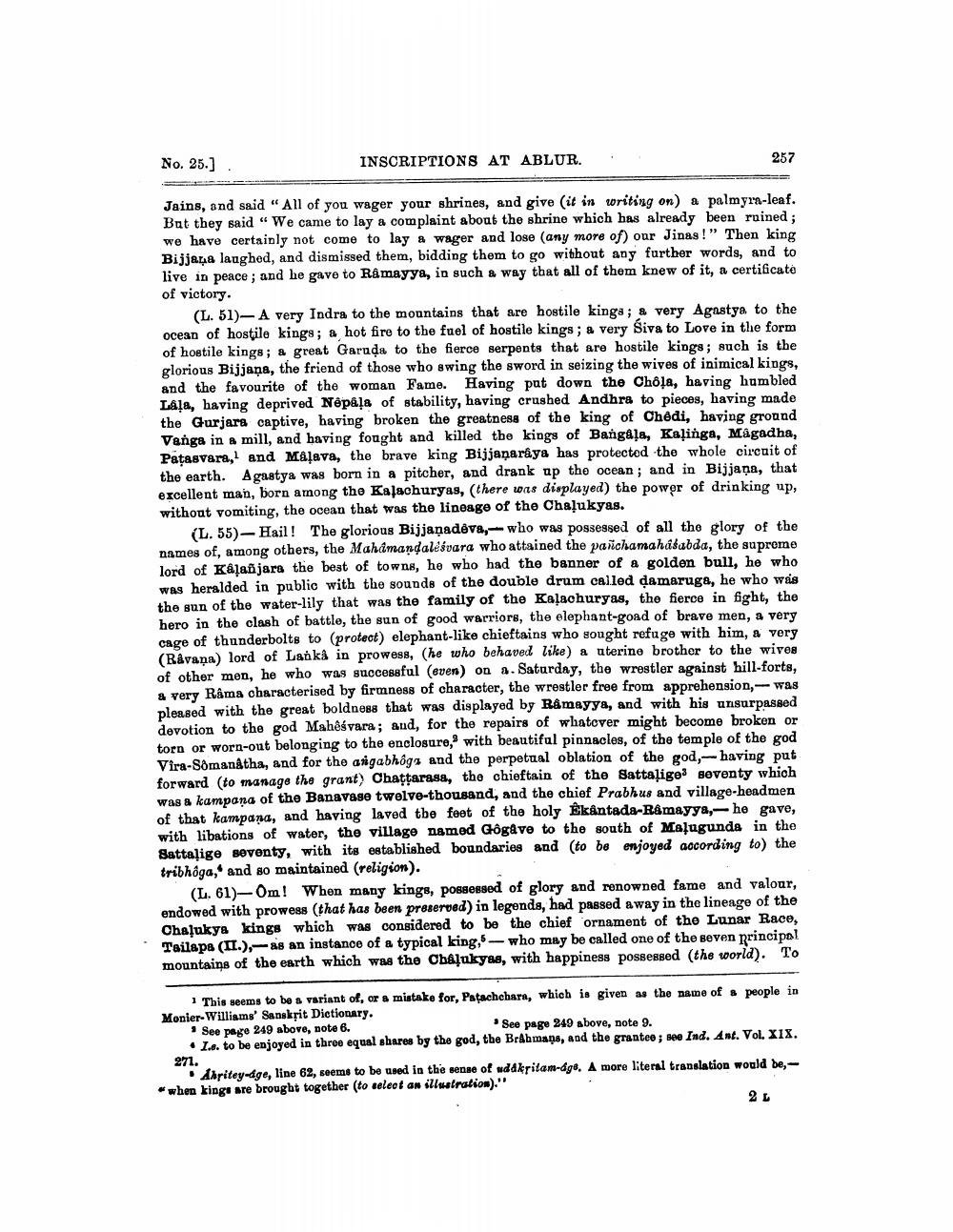________________
No. 25.].
INSCRIPTIONS AT ABLUR.
257
Jains, and said "All of you wager your shrines, and give it in writing on) a palmyra-leaf. Bat they said “ We came to lay a complaint about the shrine which has already been ruined; we have certainly not come to lay & wager and lose (any more of our Jinas!” Then king Bijjaņa laughed, and dismissed them, bidding them to go without any further words, and to live in peace; and he gave to Râmayya, in such a way that all of them knew of it, a certificate of victory.
(L. 51)- A very Indra to the mountains that are hostile kinga; very Agastya to the ocean of hostile kings; a hot fire to the fuel of hostile kings; a very Siva to Love in the form of hostile kings; a great Garuda to the fierce serpents that are hostile kings; such is the glorious Bijjana, the friend of those who swing the sword in seizing the wives of inimical kings, and the favourite of the woman Fame. Having put down the Chola, having humbled LA!a, having deprived Nepaļa of stability, having crushed Andhra to pieces, having made the Gurjara captive, having broken the greatness of the king of Chedi, having ground Vanga in a mill, and having fought and killed the kings of Bangaļa, Kaļinga, Magadha, Patasvara, and MAļava, the brave king Bijjanaråya has protected the whole circuit of the earth. Agastya was born in a pitcher, and drank up the ocean; and in Bijjana, that excellent man, born among the Kalachuryas, (there was displayed) the power of drinking up, without vomiting, the ocean that was the lineage of the Chaļukyas.
(L. 55)- Hail! The glorious Bijjanadha, who was possessed of all the glory of the names of, among others, the Mahamandalesvara who attained the pajichamahatabda, the suprome lord of Kalajara the best of towns, he who had the banner of a golden bull, he who was heralded in public with the sounds of the double drum called damaruga, he who was the sun of the water-lily that was the family of the Kalachuryas, the fierce in fight, the hero in the clash of battle, the sun of good warriors, the elephant-goad of brave men, a very cage of thunderbolts to protect) elephant-like chieftains who sought refuge with him, & very (Ravana) lord of Lanka in prowess, (he who behaved like) a uterine brother to the wives of other men, he who was successful (even) on a Saturday, the wrestler against hill-forts, & very Rama characterised by firmness of character, the wrestler free from apprehension, was pleased with the great boldness that was displayed by Rameyye, and with his unsurpassed devotion to the god Mahêśvara; and, for the repairs of whatever might become broken or torn or worn-out belonging to the enclosure, with beautiful pinnacles, of the temple of the god Vira-Somangtha, and for the angabhôga and the perpetual oblation of the god, having put forward to manage the grant) Chattarasa, the chieftain of the Sattalige seventy which was a kampaņa of the Banavage twelve-thousand, and the chief Prabhus and village-headmen of that kampaņa, and having laved the feet of the holy Ekântada-Ramayya,- he gave, with libations of water, the village named Gôgave to the south of Malugunda in the Sattalige seventy, with its established boundaries and to be enjoyed according to) the tribhôga,' and 80 maintained (religion).
(L. 61)Om! When many kings, possessed of glory and renowned fame and valour, endowed with prowess (that has been preserved) in legends, had passed away in the lineage of the Chalukya kings which was considered to be the chief ornament of tho Lunar Race, Tailapa (IL.), as an instance of a typical king; -- who may be called one of the seven principal mountains of the earth which was the Chalukyas, with happiness possessed (the world). To
This seems to be s variant of, or a mistake for, Patachchara, which is given as the name of a people in Monier-Williams' Sanskrit Dictionary. See page 249 above, note 6.
See page 249 above, note 9. • I.e. to be enjoyed in three equal shares by the god, the Brahmaps, and the grantes; see Ind. Ant. Vol. XIX. 271.
dhriteyedge, line 62, seems to be used in the sense of uddkritam-dge. A more literal translation would be,when kings are brought together (to select an illustration)."
2L




